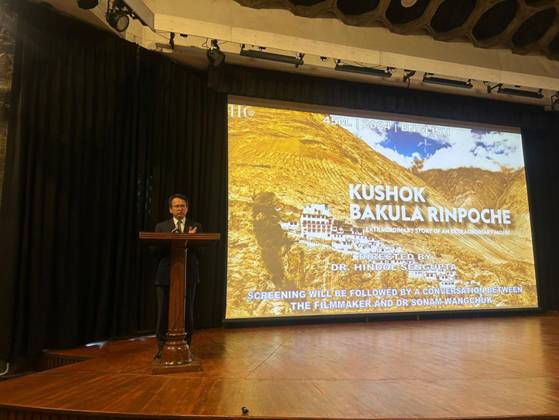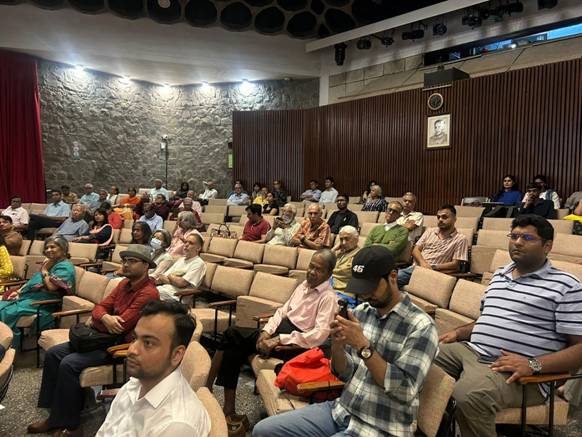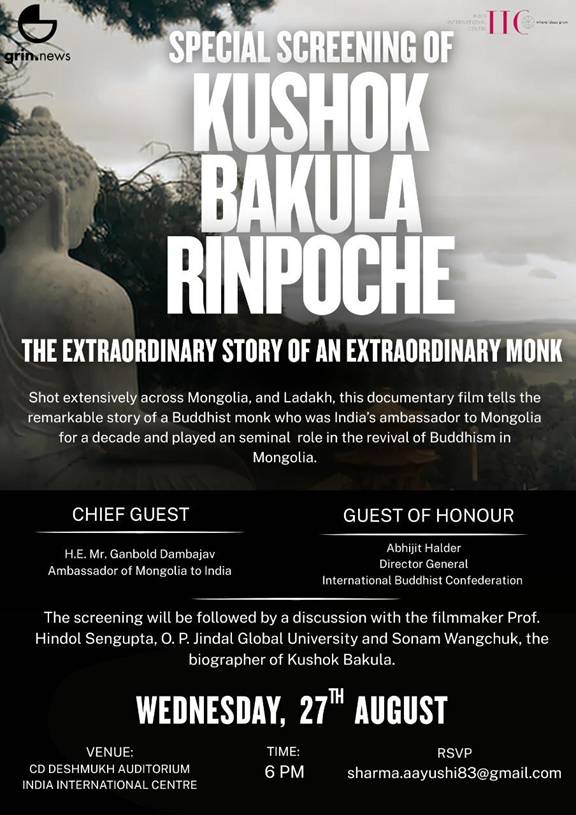Ministry of Culture
KushokBakula: The Diplomat Monk Who Revived Buddha Dhamma in Mongolia
प्रविष्टि तिथि:
27 AUG 2025 8:00PM by PIB Delhi
A pioneering documentary on KushokBakula Rinpoche premiered on 27 August 2025 at 6:00 PM at the India International Centre (IIC), New Delhi. Directed by Dr. HindolSengupta, Professor at O.P Jindal Global University, the film paid tribute to the Buddhist monk and diplomat who played a critical role in shaping modern Ladakh and reviving Buddhism in Mongolia. The Chief Guest for the event was H.E. Mr. GanboldDambajav, Ambassador of Mongolia to India and Shri AbhijitHalder, Director General of International Buddhist Confederation (IBC) was the Guest of Honour, who joined virtually through a video message. The screening was followed by a conversation between Prof. Sengupta and Prof. RavindraPanth, Director (Academic), IBC.

KushokBakula Rinpoche served as the spiritual head of PethupGompa in Spituk, Ladakh, and is revered by his followers as an incarnation of Buddha Amitabha. They believe he was among the original Sixteen Arhats—close disciples of the Buddha—and assert that his previous 19 incarnations are recorded in the Tibetan scripture NaytanChagchot.
The documentary chronicled Rinpoche’s remarkable journey, from his early days of rallying Ladakhi youth to defend their land after independence to his transformative role as India’s ambassador to Mongolia for ten years. His efforts helped resurrect Buddhism in the region following the fall of Communism, including the construction of a monastery in Ulaanbaatar, mirroring the one he had established in Ladakh. With numerous followers, including heads of state, his influence was immense.
The film also explored Rinpoche’s deep connections with India’s political leadership, from Jawaharlal Nehru to Indira Gandhi and Atal Bihari Vajpayee. It presented a portrait of a man whose influence transcended borders, shaping both the spiritual and political landscapes of two nations. The powerful narrative was brought to life by cinematographer Koteshwar Rao and produced by Rishi Suri of Grin Media.

H.E. Mr. GanboldDambajav, Ambassador of Mongolia to India said - "KushalBakula Rinpoche was a great man. He served as India’s Ambassador to Mongolia for 11 years. As a young scholar, I had the opportunity to accompany him on his tours to various places across Mongolia. I had the privilege of receiving his blessings. His presence during Mongolia's time of transition was deeply significant. Because of his presence and blessings, Mongolia experienced a peaceful transition. We are grateful to the people and the Government of India for sending him during such a difficult and transformative time. Thanks to Rinpoche, Buddhism has returned to Mongolia."
He also added “People usually wait for prime ministers, however, it was quite the opposite in Mongolia. During his tenure, our President eagerly awaited the arrival of Rinpoche”. Mongolian Ambassador to India expressed deep gratitude to the Indian government for sending such a remarkable ambassador. “After 70 years of bloodshed under the USSR, Buddhism began to revive—and at that time, Mongolia truly needed the guidance of Bakula Rinpoche.” “Shri AbhijitHalder, DG IBC said “I deeply appreciate the efforts of Prof HindolSengupta, Producer Rishi Suri and all the filmmakers who captured the legacy of KushakBakula Rinpoche. I’ve been associated with KushakBakula Rinpoche since 1990, when I was a young officer, when he visited the embassy of India in Moscow briefly. It’s been 35 years since then and I try to keep his legacy alive. After joining the IBC, we’ve worked to ensure that people understand the immense contributions he made to the Buddha Dhamma.”
He also added “We sent statues of Bakula Rinpoche to Kalmykia, Buryatia, Thuva and Mongolia, and two to Saint Petersburg and Moscow. I’m grateful that Rinpoche continues to represent us in spirit. The Shanti stupa in Leh, which is a collaboration between Budddhist monks from Japan and India, was constructed in 1983".
NambarynEnkhbayar, Former President of Mongolia, featured in the movie, said: "He reminds me of Mahatma Gandhi. I have read a lot about Gandhi. Bakula was a visionary like him. He conquered the hearts of Mongolians. Celebrating Buddha Day had become a forgotten tradition in Mongolia, but Bakula reminded us of its significance., The first celebration of Buddha Day was held again after so many forgotten years. Now, the Parliament has passed a resolution to officially celebrate Buddha Day."
Lama Purevbat from AglagButeel Monastery, who was featured in the movie, learned Thangka painting in India, while ShirendevDorlig studied meditation there. Today, Mongolia is well known for Vipassana practice, and both individuals still credit KushakBakula for making this possible.

It was Bakula who sent them to India—he deeply understood how theory and practice must go hand in hand. This was how he served society: by inspiring people through the integration of knowledge and experience. That is why many people traveled to India, including renowned meditation master Sirindeh.
SonamWangchuk who is a biographer of KushokBakula Rinpoche commented in the film about ArhatBakula, who began to be worshipped again, as it had been prophesied that an incarnation of Bakula would appear. During the time when Buddhism was in decline due to the influence of the USSR, the arrival of KushakBakula Rinpoche led many to believe that the prophecy had come true.
It was said in the movie - It is rare for a diplomat to serve in one country for an extended period—typically, the maximum is around three years. However, KushakBakula remained in Mongolia much longer and brought the sacred relics of the Buddha there in 1993. He was a Buddhist master unlike any other—his contributions cannot be understood through the lens of diplomacy alone. He was a true spiritual teacher.
Former SG, IBC Dhammapiya said Bakula served as a bridge of friendship between Russia, Mongolia, and India through the power of the Dhamma.Shri. MP Singh, the former Indian Ambassador to Mongolia in reverence of KushokBakula Rinpoche has kept the prayer hall used by him as it is, at the Indian embassy in Mongolia. He remarked that KushokBakula Rinpoche’s contribution strengthened the bilateral and economic relationship between both the nations.
The movie screening was followed by a conversation between Prof Senupta and Professor RavindraPanth. Prof Sengupta welcomed Prof. Panth, who congratulated him and remarked that wherever Buddha Dhamma exists, IBC is there to offer its support. Prof Panth mentions The United Nations has already recognized Vesak as the United Nations Day of Vesak (UNDV), affirming the universal relevance of Buddha’s teachings. Vipassana, for instance, teaches us to see things as they truly are through self-observation and introspection. By closing one’s eyes and turning inward, one begins to see clearly. Both Buddhism and Vipassana are for everyone, offering a timeless path of wisdom and inner peace.
He also emphasized that KushokBakula was a practicing monk for the society. He reiterated that Rinpoche’s message was that Dhamma is to be practiced by individuals and has to be communicated to the people by integrating tradition and the practice itself. This message should reach everyone to make themselves pure and also to inspire others.
The interactive discussion concluded with an audience member, sharing her experience who had known Rinpoche since her childhood and met him just one month before his passing, shared: "The nature of the Buddhism he practiced was rooted in the Vajrayana tradition. Yet, he was deeply committed to sending Ladakhi students to study Theravada Buddhism in places like Sarnath and Bodhgaya in India. This reflected an interesting aspect of his personality, his non-sectarian approach to the faith. It is only when I read his biography, I realized how astute he was as a statesman. It was a remarkable combination: being both a monk and a diplomat at the same time." She thanked IBC for putting efforts into this direction.
*****
Sunil Kumar Tiwari
pibculture[at]gmail[dot]com
(रिलीज़ आईडी: 2161406)
आगंतुक पटल : 918